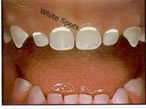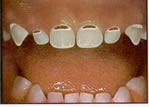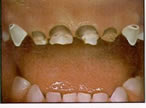We work with children, families and other health professionals to help prevent tooth decay (cavities) by providing:
- Free oral assessments of children's teeth (does not replace regular dental office visits)
- Education on how to care for teeth
- Free fluoride varnish for children at risk for tooth decay
- Help to families searching for a dental office
- Dental resources to schools and daycares
- Participation in community health fairs and wellness projects
Dental program contacts
Northeast
Chetwynd: 250-778-7202
Dawson Creek: 250-719-6500
Fort St. John: 250-263-6000
Email: DentalNE@northernhealth.ca
Northern Interior
Prince George: 250-645-3821
Quesnel: 250-983-6815
Email: DentalNI@northernhealth.ca
Northwest
Prince Rupert: 250-622-6380
Smithers: 250-847-6400
Terrace: 250-631-4236
Email: DentalNW@northernhealth.ca
Adult oral health resources
- Your oral health
- Dental health information
- Conditions
- Oral diseases
- Oral health
- Cannabis and dental procedures
Women's oral health information
Senior's oral health information
Dental treatment
Dental plan information
- Begin brushing teeth (PDF) as soon as first tooth appears.
- Brush your child’s teeth twice a day with a dab of fluoride (PDF) toothpaste about the size of a grain of rice (age 3 and older, use a pea-sized amount).
- Be a great role model. Take care of your teeth too!
- Young children cannot clean their own teeth effectively. Brush for them when they are very young and brush with them as they grow older. Once children are over 8 years of age, they can brush their own teeth with supervision.
- Baby teeth are important for making speech sounds, guiding adult teeth into place, eating and jaw development.
- Keep baby teeth healthy until they fall out naturally.
- An adult brushes my child's teeth morning and night.
- Your child uses a lidless, regular cup (around age one) (PDF).
- Offer your child a variety of healthy foods with 2-3 snacks a day of foods that do not stick to teeth. For more info, see nutrition for toddlers and preschoolers.
- Offer your child water between meals. Other drinks may be offered at mealtime and snack time. For more info, see re-fresh your drink (PDF).
- Once a month, check for new teeth or signs of tooth decay. Catch problems early...before they become big problems.
- Your child's first dental visit is around age one.
More information on children's dental health
- How to take care of your child's teeth (children 3 years of age and under)
- Oral care for your baby
- Infant and toddler dental care
- Baby's best chance (PDF)
- Toddler's first steps (PDF)
- Dental care for children
- Importance of baby teeth
- Sip Smart!
More information on funding for children's dental treatment
- Healthy Kids Program or call 1-866-866-0800 (Please have your child's Care Card ready)
- First Nations Health Authority or call 1-888-321-5003 (Please have your child's Status Card ready)
Save A Smile Program
A program funded by donations for low income families with children (19 years and under) who have dental pain, infection or a lot of tooth decay. Contact your Public Dental Health Program to learn more.
Brush morning and night with a pea-sized amount of fluoride toothpaste. Children over 8 years of age can brush on their own with adult supervision.
Dental sealants help prevent tooth decay on the chewing surfaces of back teeth. Around ages 6 and 12 years old, four adult molars grow in. Ask your dentist if dental sealants can help protect your child's teeth.
More information
- Fun zone
- Brushing and flossing
- Caring for your teeth and mouth
- Dental emergencies
- Frequently asked questions (FAQ's)
- Kids and teens
- Kissing and your health
- Mouthguard use and care (PDF)
- Oral diseases
- Oral jewellery (PDF)
- Sip all day, get decay
- Sip smart (4-6 years)
- Smile: Healthy teeth, healthy body
- Teeth whitening and other dental procedures
- Teaching resources
- More oral health resources
Funding for dental treatment
Save A Smile Program - A program funded by donations for low income families with children (19 years and under) who have dental pain, infection or a lot of tooth decay. Contact our public dental health program to learn more.
Does your child need fluoride varnish?
The Fluoride Varnish program is a FREE dental program to help prevent tooth decay (cavities) in young children under six years of age. Fluoride varnish helps strengthen teeth. If your child already has tooth decay, fluoride varnish helps stop or slow down the progress of tooth decay until your child is able to have treatment in a dental office or until their first teeth naturally fall out.
Your child should have fluoride varnish applied if...
- You or your other children have had cavities in the past 12 months, or
- Your child sleeps with a bottle with anything other than water in it, or
- Your child's teeth are not cleaned daily with a fluoride toothpaste, or
- Your child's teeth look like any of the teeth in the three images below.
| First signs of decay | Moderate decay | Severe decay |
|---|---|---|
 |
 |
 |
More information on the fluoride varnish program (PDF). Please contact us if you would like your child to have Fluoride Varnish.
If you have a family dentist, please check with them as they may want to provide fluoride applications for your child in their office.
- Plaque bacteria can be removed by brushing your teeth, Brushing your tongue and flossing.
- Breath mints, chewing gum and mouthwashes only cover up bad breath for a short time, they are not a cure.
- Regular brushing and flossing clear up most cases of bad breath.
Bad breath may also be caused by:
- Not drinking enough water
- Smoking or chewing tobacco
- Some foods
- Some illnesses like ulcers or a sore throat
If you have bad breath that won't go away, talk to your dentist or dental hygienist.
Do you have Gum Disease (Gingivitis)? It can happen at any age.
Early warning signs include:
- Red or swollen gums
- Gums may be tender
- Bleeding when you brush or floss
- Bad breath
Checklist for a healthy smile... what you do and don't do matters!
- Choose fresh fruits and vegetables when you eat on the run
- Drink water for thirst
- Limit snacking
- Wear a mouth guard for SPORTS or other activities in which your mouth may be at risk of injury
- If you do smoke or chew tobacco, consider quitting
The warnings about smoking and chewing tobacco and are true. Besides lung and heart problems, tobacco can cause oral cancers - Keep up with your dental check-ups
Dental cleanings, fluoride treatments and sealants help prevent dental problems - Brush morning and night with a fluoride toothpaste
Catch small problems early - before they become BIG problems
There's more to a dental exam than checking for tooth decay how would you know if something was wrong?
- Your dental team knows what to look for and can help you learn how you can prevent oral disease.
- If you spot trouble or have questions - visit your dental team.
Check it out - before it may become a serious problem!
Northern Health Chief Medical Health Officer: Position statement on community water fluoridation
November 7, 2014
Water fluoridation is an important public health measure. By supplementing the naturally existing fluoride in water to an effective level of about 0 .7 part per million, it safely and effectively reduces the occurrence/development of tooth decay at low cost and while children are the chief beneficiaries, adults also benefit. These health benefits last a lifetime as consumption of water continues.
Water fluoridation provides a fair way to ensure that everyone is protected regardless of income, education, or financial ability to seek dental care. People benefiting the most from water fluoridation are those most susceptible to tooth decay.
Typically these are the poorest and most disadvantaged members of our community. In Northern Health we perform approximately 1000 surgical procedures each year for dental extractions and restorations. About 75% of these are done on children under the age of 10 years.
Adequately fluoridated water could prevent most of these but unfortunately many of our communities do not provide fluoride supplementation to their water supplies and increasingly, the efforts of “anti-flouridationists” have been successful in eroding public confidence in this safe and cost effective public health measure.
The world-wide evidence supporting water fluoridation is well-founded and continues to grow. Few other public health measures have been the subject of more intensive scientific review. Over fifty years of animal and human scientific studies have shown water fluoridation to be safe and effective.
The Canadian Dental Association, the American Dental Association, the World Health Organization the U.S. Public Health Service and its Centers for Disease Control, and the Fédération Dentaire Internationale, continue to monitor fluoride's effects.
Periodic allegations of "new evidence" purporting to show the harmful effects of fluoridation do not withstand the test of objective, scientific scrutiny. In communities where fluoridation is discontinued, the rate of dental caries begins to climb almost immediately.
Northern Health includes in its Strategic Directions the commitment to “lead initiatives that improve the health of the people we serve.” The maintenance of adequate levels of fluoride in drinking water to prevent and reduce dental caries remains a public health best practice that we encourage communities to implement if they do not have it, and to maintain if they do.
Dr. Sandra Allison BSc MPH CCFP FRCPC
Chief Medical Health Officer
Northern Health
